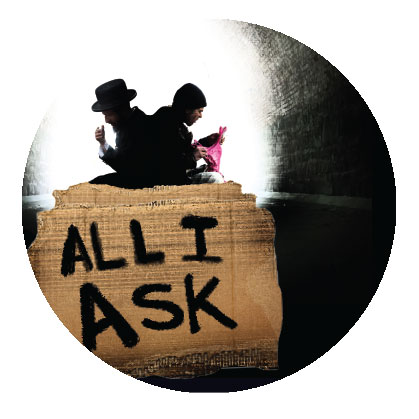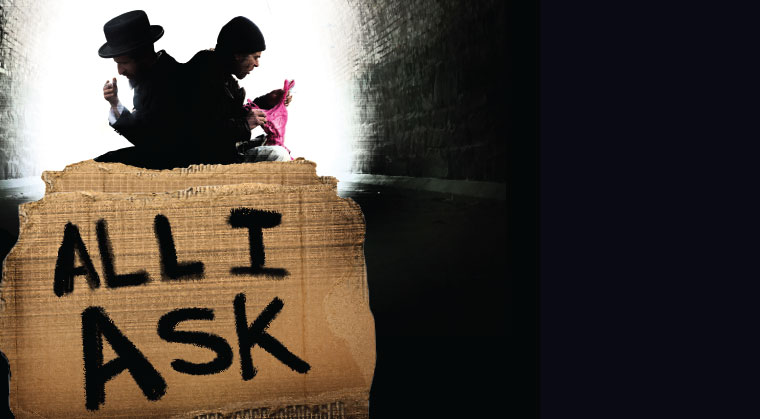All I Ask: Chapter 53


He paused for a second and added, “But that old man out there… maybe we could invite him to come in and warm up?”
"W
arm food for cold days!” read the orange plastic sign on the door of the coffee shop. Tomer prepared steaming cappuccinos for two bochurim, put their order of cheese bourekas in the oven to warm up, and went to see how his new worker was getting along in the kitchen.
The worker looked up with a troubled expression.
“What’s the matter?” Tomer asked. “Is there a problem?”
“No, everything’s okay here,” the worker said, not too heartily. He paused for a second and added, “But that old man out there… maybe we could invite him to come in and warm up?”
“Hmm…” Tomer glanced out to the street. An elderly fellow was sitting on the bench outside. Next to him was a grayish baby carriage piled high with ratty-looking bundles. He must be homeless. To let someone like that in could put off customers. But the poor old guy….
Tomer ruminated for a moment. “Bring him into the kitchen,” he decided. “And when you’re done grating the cheese, cut up some more potatoes for fries, and slice onions for soup. That batch of onion soup we made in the morning is gonna be finished soon, people really like it in this weather.”
Lulu sat in the relative shelter of the pillared area of Davidka Square, huddling in his shabby coat. He’d never felt so cold before. Not in London when he was still young, not in California, and not here in Jerusalem. Was it old age creeping up on him, or was the world getting colder? The greenhouse effect, maybe, or the hole in the ozone layer he’d read about long ago? No, the hole in the ozone had nothing to do with global warming, it only caused greenhouse gases to pile up… or was it the other way around? This wasn’t making sense. Who could think straight in this cold?
“Lulu!” someone called from behind him. “You want to come in with me to the coffee shop? It’s nice and warm in the kitchen.”
Lulu turned around in surprise. “Bugi! How’re you doing? So that’s the place you were telling me about, that was looking for some extra help?”
“Yeah, it’s right here,” said Bugi. “Are you coming? ’Cuz I have a lot of work to do.”
Lulu followed Bugi into the shop. Bugi found him a dirty plastic stool to sit on, and Lulu sank his frozen bones onto it. As his confused thoughts slowly grew clearer, the two friends passed several minutes in silence.
Bugi sliced onions into rings and dumped them into the huge steamer. Then he put the peeled potatoes through the slicer, cutting them into long pieces. He finished prepping the fries and began washing the dishes. “He called me a pampered prince,” he said suddenly, catching himself unawares.
“Who?”
Bugi was about to say, “Your rich nephew,” but caught himself in time to say, “Some friend of Yanky Kleiner’s” instead. He didn’t want Lulu to start raving again, especially here at work.
“Somebody with their own apartment, and money, and family?”
Bugi nodded.
“And he thinks you’re spoiled, because in his opinion you should be trying harder to make money and get ahead?”
“No, not that.” Bugi turned the faucet off and faced Lulu. “He thinks because I got a lot of love from my parents, and he didn’t, I was incredibly pampered. And that’s all that matters, according to him. Never mind the fact that both of my parents died and I was left homeless and penniless.”
“This guy who said you’re spoiled, he never slept in the street, right?”
“I would bet not.”
“And he never found himself suddenly with no more money, right?”
“Right.”
“Then don’t expect him to understand you,” Lulu said firmly. “He thinks hunger for parents’ love is worse than real hunger, but that’s only because he’s never experienced real hunger, or real cold, or real poverty.”
“Really?” There was hope and desperation in Bugi’s voice. He needed validation.
“Really. Survival comes first. Only after a person has enough food, water, money, and a roof over his head can he start worrying about all sorts of other needs with fancy psychological names.”
“So it’s okay that I feel… like I’ve had it tough?”
“It’s always okay to feel like you have it tough. And it doesn’t matter what other people say.” Lulu looked around the kitchen. Hills of vegetables stood on a big, gleaming, stainless steel surface. “Maybe you’d like some help?” he offered. “I could peel vegetables, or chop them — whatever you need.”
“Uh…” Bugi groped for words as a stream of thoughts raced through his mind: That would be gross. I can’t have you touching those vegetables. It’s repulsive. You’re repulsive. And I can’t believe how disgusted I am by you all of a sudden. You’ve been such a good friend to me, I owe you so much, but… you’re gross. I don’t want to get near you.
“Here, let me have a go at it.” Lulu was already standing up. “Where’s the peeler?”
“No, don’t. It’s… not allowed. I mean, I don’t think the mashgiach kashrut would allow it.” Bugi grasped at this line of reasoning. “He gave me all sorts of instructions, and nobody else is allowed to handle the food here. And there’s also the health regulations. If the inspectors from the Ministry of Health pop around and see you here, unauthorized, and without gloves… and uh, my boss, too — he’s got a special way he wants the vegetables cut, and he… only wants them cut that way.”
“All right, so I’ll just rest a little bit longer,” Lulu said, resigned. He didn’t bother pondering Bugi’s clumsy excuses too deeply. He had other things on his mind, like where he was going to live next, once the owners were ready to start renovating the shabby old place he was staying in. That could be any day now, and what would he do then?
He was already eating up the savings he’d put aside for his old age, the money he’d planned to use to help Bugi, if necessary. There didn’t seem to be any need for that, thank G‑d. Bugi was working hard.
“Last week, I went around cleaning up the yards around the local apartment buildings,” Bugi was saying, glad to change the subject after Lulu settled back down on the greasy stool. “I got two hundred shekels for every yard, and every place I worked, before I was finished people from other buildings came up to me and asked if I could do their yard, too. All my bones were creaking by the end of the week. And then this guy has the chutzpah to call me pampered.”
“That really is chutzpah,” Lulu hastened to agree. “But think about it. It could be that he has it tough too. Did you ever think of that?”
“Maybe he imagines that he has it tough,” Bugi huffed as he turned his attention to a big platter. Right, so tough, being the only son of a big gvir and getting a fancy apartment from his dear father as a wedding gift.
“True, maybe he’s imagining it,” Lulu said easily. The warmth in the shop was doing him good. “And if he imagines that he has it tough, why should you care?”
“Because I really do have it tough!” Bugi gave him a “what’s so hard to understand” look.
“I understand that you really have it tough. But my question still remains: Why should you care if that guy imagines that he has it tough, too?”
“Because… because it’s not true. He doesn’t know what tough is!”
“Fine. But you’re still not answering my question. Let’s say you really have it tough, and that guy doesn’t really have it tough, he only thinks he does. Why do you care what he thinks?”
“I don’t care if he thinks he has it tough. But why did he have to say I don’t have it tough?”
“So he said it — nu?”
“But I do have it tough!” Bugi said petulantly. “Every morning I have to tear myself out of bed when I’m still so tired from the day before and all I want is to stay under the blankets forever. I work nights at the yeshivah when they need me, and in the mornings I’m here, and I’m paying all my bills on time, and buying only what I need, and saving up, and going without all kinds of things, and trying to live like a regular person, and…”
“And after all that, people tell you you’re a pampered prince.”
“Right!”
“So that’s their opinion. And you know what I say? I say you’re a hero.”
Bugi gave him a puzzled look.
“Bugi, you got yourself out of the homeless life, on your own power, without help. Not many people could pull that off, and stick with the program like you have.”
“It wasn’t exactly without help,” Bugi said. “You helped me, and so did Mordechai, and Yanky, and his brother….”
“Yes, we gave you a little help, from the outside. But you did the real work, in here.” Lulu tapped his chest. “To tell you the truth, there were times when even I didn’t believe you’d make it.”
“But I did.” A smile of pure bliss settled on Bugi’s features. “I even booked a room at the hotel already.”
Lulu’s eyes lit up. “Did you really, Bugi? A room at the Mamilla Hotel?”
“That’s right. I booked a room at the Mamilla Hotel.”
“But they must have wanted a credit card number, if you booked a room.”
“No problem. I have a credit card, and I paid the advance.”
Lulu almost got up and danced. “You… you did it! You made it, Bugi! You’re going to walk in there like a king, and a bellhop is going to take your suitcase, like those VIPs we saw there….”
“You want to come with me?” Bugi suggested. “I booked two nights, in early February.”
“No, I don’t go to hotels.” If I do, I might start craving that money Sandy’s holding for me. “I’ll just stand on the corner there and watch. The same place where I stood when they threw you out that day. And I’ll see the concierge greeting you and treating you with respect, like you deserve. Hey, how much is a bowl of that onion soup you’re making?”
“Fifteen. Should I get you some? This batch isn’t ready yet, but there should still be some out front from this morning. It’s delicious, and it’ll really warm you up. And for two more shekels you can have it with cheese on top.”
Lulu counted the money in his pouch. Business was so bad lately, so bad. He was getting too tired to stand there entertaining the passersby, or to act as an impromptu guide for tourists. He wasn’t even able to keep to his regular hours anymore: his workdays were starting way too late, and he was getting tired way too early.
“Here,” he said and sighed. “Take seventeen shekels and give me some with cheese.”
(Originally featured in Mishpacha, Issue 809)
Oops! We could not locate your form.


